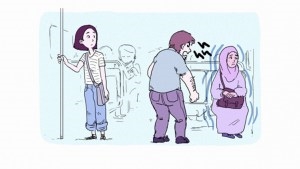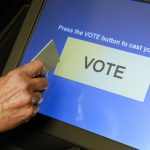These Posters Explain How To Help Stop Islamophobic Attacks In Public
In late June, the city of Boston was left in shock after a 34-year-old man assaulted a 61-year-old woman in a headscarf riding the MBTA’s Orange Line. Yelling anti-Muslim slurs at her and accusing her of carrying “a bomb that would kill us all,” according to a press release from the Suffolk County district attorney’s office, he then struck her with an umbrella and smashed a window on the train.
Hate crimes, especially against Islamic people, have been on the rise since the election of Donald Trump in November: The Southern Poverty Law Center, in its “Year in Hate and Extremism” report, found that the number of anti-Muslim-identifying groups in the U.S. rose 197%–from 34 in 2015 to 101 last year. Due to underreporting and lack of documentation, hate crimes and bias incidences themselves are notoriously difficult to track (the nonprofit investigative news organization ProPublica has launched a database called Documenting Hate in an attempt to amend that). But after last month’s incident, Boston is launching a poster campaign to try to curb acts of Islamophobic violence before they even occur.
On July 17, the city of Boston installed 50 posters advising people on what to do if they witness Islamophobic behavior. The cartoons, drawn by a French artist known as Maeril, feature a nervous-looking woman in a hijab being threatened on public transit, and illustrate a step-by-step guide to intervening in a situation before it escalates. Sit beside the person being harassed and introduce yourself; pick a random subject (a movie, the weather) and start discussing it; keep holding eye contact with the person feeling threatened and refusing to acknowledge the perpetrator; continue the conversation until the attacker leaves and, if necessary, escort the targeted person to a safe space. (Of course, as we saw when bystanders attempting to stop Islamophobic attacks were killed Portland, there are times when the harasser is so violent, you may need to involve the authorities rather than simply ignore them.)
The technique, according to WBUR, is called non-complementary behavior, and it de-escalates situations by disempowering the perpetrator—by refusing to acknowledge what they are doing or saying, you’re sending a clear signal that their actions have neither an effect nor an audience. San Francisco and New York have launched similar campaigns.
“The climate across the nation is certainly different under the current White House administration,” Yusufi Vali, executive director of the Islamic Society of Boston Cultural Center, told WBUR. “The Boston-Muslim community is feeling what the rest of the nation is feeling: a lot of uncertainty and a sense of insecurity.”
While the posters, which will remain in place for six months, depict a response to Islamophobia, the tactics outlined in the illustrations can be more broadly applied: Substitute in a woman on the receiving end of vulgar comments about her appearance (another scenario trickling down from the current administration) or a man being subjected to anti-Semitic threats; the techniques would still be effective, and they’re straightforward enough to encourage anyone to feel capable of intervening.
Plastered around the city of Boston for the next six months, the fliers contain some salient advice, namely: Help the victim disengage from the person spewing hate speech.
In late June, the city of Boston was left in shock after a 34-year-old man assaulted a 61-year-old woman in a headscarf riding the MBTA’s Orange Line. Yelling anti-Muslim slurs at her and accusing her of carrying “a bomb that would kill us all,” according to a press release from the Suffolk County district attorney’s office, he then struck her with an umbrella and smashed a window on the train.
Fast Company , Read Full Story
(30)













